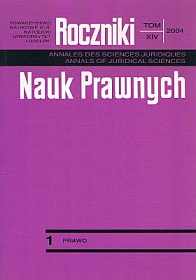Recognition of Non-Catholic Churches Whose Legal Situation Was Regulated by Years 1919-1989
Abstract
The subject of the present study is to present the legal situation of particular Christian, non-Catholic Churches that functioned in Poland in the years 1919-1989, and whose legal existence resulted from statutory regulations. The study is concerned with: the Eastern Old-Rite Church having no clerical hierarchy, the Evangelic-Augsburg Church, the Moravian Brethren Unity, the Evangelical-Lutheran Church, the Evangelical Church of the Augsburg and Helvetian Confession, the Evangelical-Union Church, Autotocephalous Orthodox Church of Poland, the Evangelical-Methodist Church, the Evangelical-Reformed Church, the Mariavite Church, the Mariavite Old-Catholic Church, the Old-Catholic Church, the Mennonites, the Free Bible Students, the Seventh-Day Adventists Church, and the Baptist Christians Church. As regulations concerning these congregations after World War I were issued gradually, it was necessary to take up the question of their legal status in Poland after 1919 that resulted from the legislature of the countries to which parts of Poland belonged, and which was binding until Polish legal regulations were issued, establishing their legal situation.
The analysis of the legal position particular Christian Churches and congregations had in Poland in the years 1919-1989 that is presented in the article shows that in that period the state authorities clearly tried to simplify the procedures of recognizing the congregations as much as possible. Soon after the end of World War II, in the years 1945-47 the government looked for such a model of recognizing congregations in which the executive authority had the most competences. This practice was begun by issuing in the years 1945-47 two decrees with the power of Acts, recognizing the Methodist, Evangelical-Reformed, Mariavite and Mariavite Old-Catholic Churches. Each of the two decrees was clearly different from analogous legal acts issued in the years 1919-1939. In the same period the authorities looked for such a model that would give all the competences in that field to the executive authority, which was contrary not only to the letter, but also to the spirit of the March Constitution.
References
Abraham W.: Konstytucja a stosunki wyznaniowe i Kościół, Kraków 1922.
Allermissen K.: Konfessionskunde, Hannover 1930.
Allgemeines Landrecht für die Preussischen Staaten, hrsg. von Dr. C. F. Koch, Bd. IV, Berlin–Leipzig 1886.
Burckhard J.: Gesetze und Verordnungen in Cultussachen, Wien 1895.
Dziobek-Romański J.: Zasady uznawania związków religijnych w prawie polskim w latach 1944-1989, „Roczniki Nauk Prawnych”, 9 (2001), z. 1, s. 69-109.
Denkschrift betreffend Akte des Polnischen Staates gegen die unierte evangelische Kirche in Polen, Poznań 1920.
Ebers G.: Evangelisches Kirchenrechts in Preussen, I. Bd. A. Evangelische Kirche d. Altpreussischen Union, München 1939.
Ebers G.: Staat und Kirche in neuen Deutschland, München 1930.
Falkowski E.: Ustrój Wileńskiego Kościoła Ewangelicko-Reformowanego (była Jednota Ewangelicko-Reformowana Wielkiego Księstwa Litewskiego), jego stosunek do Państwa Polskiego i jego uprawnienia w dziedzinie prawa małżeńskiego, Wilno 1936.
Glass J.: Stan prawny Kościołów Ewangelickich w b. Królestwie Polskim, „Rocznik Ewangelicki”, 1925, s. 259, 268, 274n.; Grelewski J.: Stan prawny Kościołów Ewangelickich w b. Królestwie Polskim i na Kresach wschodnich, Sandomierz 1935.
Glass J.: Wyznania protestanckie i sekty religijne w Polsce współczesnej, Sandomierz 1937.
Hinschius P.: Staat und Kirche. Marquardsen’s Handbuch des Öffentlichen Rechts, Freiburg im Br. 1883.
Historia prawosławia na Białostocczyźnie, http://www.bialystok.bptnet.pl/Orthodox/ histreg.htm.
Kiryłowicz S.: Wyznania nierzymskokatolickie w Polsce, „Zeszyty Argumentów”, 1967, nr 3(32).
Komarnicki W.: Polskie prawo polityczne, Warszawa 1922.
Langrod J.: O autokefalii prawosławnej w Polsce, Warszawa 1931.
Łotocki A.: Autokefalia. Zasady Autokefalii, Warszawa 1932.
Pawłowicz Z.: Kościół i sekty w Polsce, Gdańsk 1996.
Pietrzak, Prawo wyznaniowe, s. 153.
Правное положенье Святой Автокефальной Церкви в Польше, Warszawa 1931.
Sawicki J.: Stan prawny Kościoła Mariawitów, „Gazeta Administracji i Policji Państwowej”, 1935, nr 7, s. 222-224.
Sawicki J.: Studia nad położeniem prawnym mniejszości religijnych w państwie Polskim, Warszawa 1937.
Świątkowski H.: Wyznaniowe prawo państwowe. Problematyka prawna wolności sumienia w PRL, Warszawa 1962.
Witkowski W.: Organizacja kościoła ewangelicko-reformowanego w b. zaborze rosyjskim, „Gazeta Administracji”, 1936, nr 20, s. 625-628.
Wysoczański W.: Prawo wewnętrzne nierzymskokatolickich Kościołów iwyznań w PRL, Warszawa 1971.
Zyskin M.: Autokefalia i zasady jej zastosowania, Warszawa 1931.
Copyright (c) 2004 Roczniki Nauk Prawnych

This work is licensed under a Creative Commons Attribution-NonCommercial-NoDerivatives 4.0 International License.


